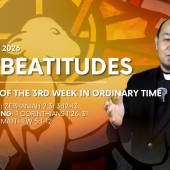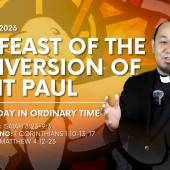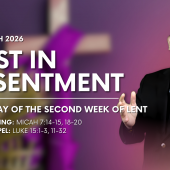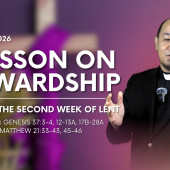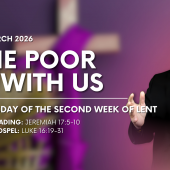Steadfast endurance for the sake of the Gospel!

Reflection Date: October 12, 2025 Twenty-eighth Sunday in Ordinary Time
Daily Readings: 2 Kings 5:14-17; 2 Timothy 2:8-13; Luke 17:11-19
Gratitude creates happiness and well-being in the human body. A grateful Syrian, Naaman, became a new being both in flesh (healed of his leprosy) and in spirit as he converted to Judaism. He vowed to renounce his former religious allegiance and to offer sacrifice to the God of Israel. The Samaritan who was healed of leprosy returned to Jesus, singing His praises and prostrating before Him in gratitude. Both were non-Jews. Besides being grateful, both are shining examples of faith, it was because of their faith that they were healed.
The First Reading from the Second Book of Kings narrates the healing of Naaman the Syrian through the intervention of the God of Israel and at the recommendation of the prophet Elisha, the man of God. Naaman initially thought that the man of God would come to him, call upon the name of his God, touch him, and heal him. He was disappointed when that did not happen and made up his mind to return home. However, he heeded the advice of one of his soldiers, obeyed Elisha’s command, and was healed after immersing himself seven times in the Jordan River. He then made a confession of faith: “Now I know that there is no God in all the earth except in Israel; please accept a present from your servant” (2 Kings 5:15). He offered gifts to the man of God, but Elisha refused to receive them. Touched by this gesture, Naaman renounced idolatry and embraced the faith of Israel. He then requested the prophet for two mule-loads of earth so that he might continue to offer sacrifice to the God of Israel. We can see that physical healing led Naaman to a spiritual experience of transformation. He was transformed into a new person because of Elisha’s impressive behavior and attitude.
The Second Reading is taken from the Second Letter of St. Paul to Timothy, the young bishop of Ephesus. Paul exhorts his spiritual son to remember Jesus Christ, who is risen from the dead and is a descendant of David. Paul is in chains like a criminal in prison for the sake of the Gospel he believes in and preaches. He is bound, but the Word of God is not bound. The grace of God that Paul received enables him to endure everything for the sake of the chosen people and their salvation in Jesus Christ. The author outlines four trustworthy sayings:
(i) If we have died with Him, we will also live with Him; we must die for ourselves.
(ii) If we endure, we will also reign with Him; we must learn to persevere.
(iii) If we deny Him, He will also deny us; we cannot afford to deny Christ.
(iv) If we are faithless, He remains faithful, for He cannot deny Himself.
This teaching reveals Paul’s unwavering faith and character.
The Gospel Reading presents Jesus traveling to Jerusalem through the region between Samaria and Galilee, a place few dared enter, as lepers roamed those areas. Usually, it was considered a forbidden land. Ten lepers approached Jesus and did something they were not supposed to do. They showed great courage and confidence by addressing Him as “Master” and pleading for His mercy. Jesus commanded them to show themselves to the priests, and they were healed along the way. Only one of them, a Samaritan, decided to return to Jesus. He praised God with a loud voice, prostrated himself at Jesus’ feet, and thanked Him for His miraculous intervention. A grateful heart sings praises to God. This man was an outsider, despised by Jewish society, for Samaritans were considered a mixed breed. It is understood that the rest were Jews. Jesus credits the Samaritan’s faith with his healing. All ten were healed physically, but only the Samaritan was healed spiritually.
Amazingly, all ten were known as lepers when they were sick and isolated by society. Once healed, they began to be identified, or we began to identify them as Jews and a Samaritan. We can even stretch our reflection a bit and say: grateful Samaritans and ungrateful Jews.
Call to Action: Those of us who long for union with Jesus Christ cannot afford to avoid suffering. It is through His suffering that Jesus saved humanity!
Radio Veritas Asia (RVA), a media platform of the Catholic Church, aims to share Christ. RVA started in 1969 as a continental Catholic radio station to serve Asian countries in their respective local language, thus earning the tag “the Voice of Asian Christianity.” Responding to the emerging context, RVA embraced media platforms to connect with the global Asian audience via its 21 language websites and various social media platforms.










